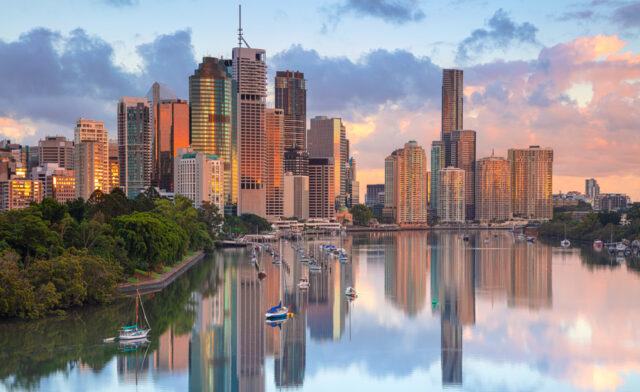Brisbane’s winning bid for the 2032 Olympic Games is good news for all of South-East Queensland, says a leading researcher, with new and upgraded infrastructure benefits to flow quickly.
Associate Professor Pierre Benckendorff from the University of Queensland says much of the infrastructure featured in Brisbane’s bid was already in the pipeline, but the Games will create more urgency to push forward with planning.
“What the Olympics does is gives us something to aim for and creates a little bit of momentum to get those infrastructure projects finished sooner than they otherwise would have,” he says. “It allows the state government to tap into funding and the federal government to prioritise funding for infrastructure.
“When cities get Olympic Games, there’s usually a big cash splash for developing infrastructure.”
Organisers pitched Brisbane’s bid as a low-cost and sustainable Games in keeping with the IOC’s ‘New Norm’, a fresh strategy that emphasises sustainability and limits new construction.
“In the past, a lot of Olympic cities built completely new sports facilities,” says Benckendorff, using the example of Sydney Olympic Park, which was developed at Homebush for the 2000 Olympics. “That’s not the approach they’re taking here. They’re reusing a lot of existing sports facilities.”
According to Brisbane’s 2032 Olympic Master Plan, 84 per cent of the venues included in the bid are either existing or temporary. The plan proposes three hubs in South-East Queensland – Brisbane, Gold Coast and Sunshine Coast – connected by high-quality road and rail transport networks.
Olympic Infrastructure Agency
The Queensland and Federal governments will establish a joint Olympic Infrastructure Agency to deliver key projects for the games. New builds featured in the bid include the Brisbane Arena, a 15,000-seat aquatic centre in the CBD; a 12,000-seat basketball facility; and a 10,000 seat gymnastics and boxing centre.
Athletics events and the opening and closing ceremonies will be held at the Brisbane Cricket Ground, known as the Gabba, which will undergo a $1 billion redevelopment to increase its capacity from 42,000 to 50,000. A new underground rail station will also be built at the site as part of the Cross River Rail project.
Pedestrian access is another critical component of infrastructure ahead of the Olympics. “Brisbane is putting a lot of effort into cycling lanes, e-bikes, pedestrian walks, and building wider sidewalks to encourage more pedestrian activity and planting trees to provide shade,” says Benckendorff. “Brisbane City Council is also funding green bridges that will link different parts of the city and make it much easier for people to move around the city and get across the river.”
One of the five bridges pledged by Lord Mayor Adrian Schrinner is the Breakfast Creek Green Bridge, which links Newstead to Albion and will connect the proposed Olympics Athletes Village at Northshore Hamilton to the city.
Infrastructure beyond Brisbane
The Gold Coast and the Sunshine Coast are important Olympic hubs that will host a range of sports including beach volleyball, triathlon, road cycling and the marathon.
The 2032 Olympics offers an opportunity to improve transport links across the densely populated South-East Queensland region, says Benckendorff. “Over the next 10 years, the Gold Coast, the Sunshine Coast and Brisbane will start to blend into one big urban area of about four or five million people.”
Reducing travel time by train between Brisbane and both the Gold Coast and Sunshine Coast, currently a two-hour journey, is a priority, Benckendorff says. “Another gap will be to reduce that travel time by putting in place a high-speed rail network, at least from the Sunshine Coast all the way through to the Gold Coast but potentially all the way to Toowoomba.”
An extension of the Gold Coast light rail system, known as G:link, is underway to link the network to Coolangatta airport. “There’s a really good opportunity to extend the Brisbane Metro, which is already a major infrastructure project, out to the airport as well.”
The Games bottom line
Olympic Games frequently run over budget and rarely turn a profit for host cities. According to an Oxford University paper published in 2020, “every Olympics since 1960 has run over budget, at an average of 172 per cent in real terms”.
The 2016 Olympic Games in Rio de Janeiro cost almost $14 billion, or 352 per cent over budget, while the 2012 Olympics in London came in at just under $15 billion, 76 per cent over budget. The 2020 Olympics in Tokyo, held in 2021, cost $15.4 billion, making it history’s most expensive games.
Brisbane 2032’s operating budget of $4.5 billion does not include infrastructure already slated for development, such as the Cross River Rail, a 10-kilometre rail line from Dutton Park to Bowen Hills that includes 5.9-kilometre twin tunnels under the Brisbane River and the CBD, and Brisbane Metro, a rapid bus transit system currently under construction.
A KPMG report estimates that the 2032 Brisbane Olympics will deliver $8.1 billion and $17.6 billion in economic and social benefits to Queensland and Australia, respectively. Whether this plays out is another matter; modelling by Monash University shows that the 2000 Olympics in Sydney failed to deliver on its economic promises, instead costing New South Wales households $420 each.














